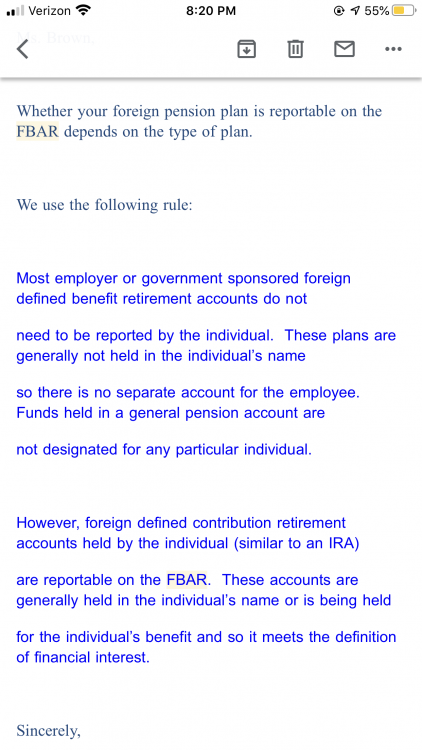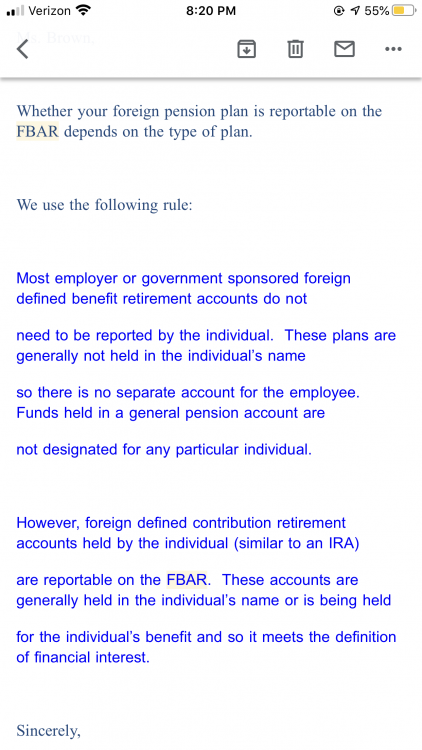-
Posts
928 -
Joined
-
Last visited
Content Type
Profiles
Forums
Partners
Immigration Wiki
Guides
Immigration Forms
Times
Gallery
Store
Blogs
Posts posted by QueenOfBlades
-
-
Just make sure you research the relevant tax forms and track the amount before filing your returns. If it’s over a certain amount, you need to report it to the IRS on Form 709. Think it’s around the $15,000 mark but you’d need to check the exact dollar amount and check each year. You don’t have to actually pay taxes on it though unless your gift eventually exceeds the lifetime limit (which is in the millions - anything you go over the threshold with is deducted from your lifetime limit).
-
@TBoneTX You can probably see already, but given we are in Seattle, that’s a pretty solid reason not to touch it as well 🤣
-
They just send them by mail to all registered citizens (who I assume are validated with some kind of ID) and has their name and information on it, so it wouldn’t have been me legally voting, he just wanted me to put them in because I was on the driver side where the drop box was.
I looked at him and said even if the ballots are not mine, there is no way in Hell I am putting ballots in a drop box and want to be as far from them as possible.
-
I have been getting several accusations from my USC spouse and USC best friend of being paranoid about all things immigration. I think I am being reasonable because there is no putting a foot wrong in this process.
I had been worried about my taxes and FBAR/FATCA until I could finally confirm I was in compliance. That’s not paranoid, that’s reasonable given the stuff penalties if you don’t comply. I believe in carefully employing risk management techniques.
I know voting is the “kiss of death”. Neither of them drive. I drove with him to the ballot drop off box yesterday and I made him physically put their ballots in. I said I wasn’t touching a balloting box. He sighed and said about me being paranoid again.
-
You’re welcome. I’d never seen this form because I’ve been a resident since 2015 and lived here since 20-3 (my income actually supports two USCs) but I’ve gone through the wringer so many times that I’m used to going through those instructions extremely thoroughly;; making sure I’ve cleared my bases. I did my own documents, on 10 year green card now, and going over the form and instructions word for word.
Get the evaluation for USCIS. It could help with getting a job. In reality though, they’re pretty much always the same though.😝
-
As far as foreign bank reporting goes, probably.
Another one to keep in mind is FATCA, but the limits are higher. $50,000 if single, $100,000 if married filing jointly. I believe that has a wider range of assets that need to be reported however.
Do you have a retirement account? Savings account? In a trust? The different types of accounts can be treated differently for tax purposes, as well as the country itself because of tax treaties. These can make something tax-free in one country taxable in the US.
But yeah, FBAR and FATCA are the biggies.
-
This is the instructions for the form they are talking about.
https://www.uscis.gov/sites/default/files/files/form/i-944instr-pc.pdf
“Evidence. At the time of filing, you must submit all evidence and supporting documentation listed in the What Evidence Must You Submit and Specific Instructions sections of these Instructions.”
Under the Specific Instructions section, Part 4, Item Nos 2 and 3:
“Foreign education should include an evaluation of equivalency to education or degrees acquired at accredited colleges, universities, or educational institutions in the United States. For
a list of organizations that provide equivalency evaluation, see the National Association of Credential Evaluation Services (NACES), at http://www.naces.org/members.htm.”Then later:
”You must submit all initial evidence requested in these Instructions with your Form I-944. If you fail to submit required evidence, your application may be rejected or denied in accordance with 8 CFR 103.2(a) and (b)(1) and these Instructions.”
Yes, in reality, they are the same. USCIS forms are different and this one is so new that no one has really seen how it’ll play out yet. The form itself says to provide documentation as outlined in the Instructions. The Instructions say all transcripts must be provided if they are available, and if not, an explanation why and if possible, a letter from the institution confirming unavailability. Again, foreign education ‘should’ include an evaluation from an accredited service on the link the instructions provide. It unfortunately doesn’t seem to clarify how the evaluation is supposed to be done. My assumption would be to file with I-485 because of sometimes passing over the AOS interview: in which case you’d never get to show them the transcript and if they don’t see it in your application, there’s always the risk they might be a hard a*s with this new rule and see it as not having complete documentation. That said, it could prove difficult for K1 filers with the 90 day deadline. They should really have made that clearer.
Anyway - in my view, the instructions clearly say foreign education should include the evaluation and they specifically list where to get the evaluations done to their standard. The rest of the form says documentation must be provided as instructed. If it were me, I would reach out to some of these NACES companies for quotes and estimated turnaround times so I could send the documentation with my AOS application, just to cover myself. It is easier if you have your old transcripts for your GCSEs already.
USCIS and the IRS have given me PTSD so if they say I should include anything, I follow that down to the letter. I don’t take any chances with them.
-
Because it’s listing your equivalent education on an official USCIS form, I wouldn’t just say yes without evidence. The instructions for the new form itself recommend contacting a NACES organization to get your qualifications reviewed and certified for their US equivalent. See below:
I’ve only taken a brief look at some members but this one below seems to be familiar with the English education system as well as requirements for immigration/USCIS specifically;
https://www.ece.org/ECE/Individuals/Immigration-Reports
Actually, upon reviewing the instructions for this new form, it says you NEED the equivalency evaluation from my understanding of it.
“Foreign education should include an evaluation of equivalency to education or degrees acquired at accredited colleges, universities, or educational institutions in the United States. For
a list of organizations that provide equivalency evaluation, see the National Association of Credential Evaluation Services (NACES), at http://www.naces.org/members.htm.”
Sort of unrelated form advice but as a fellow English expat:For what it’s worth, as an unconditional permanent resident and having lived in the US for 7 years now, in practice, I’ve always had everyone treat my GCSEs as a HS diploma equivalent so I doubt you’ll get much different from a professional evaluation. I think the requirement is 5 GCSEs with C or above or something like that. I work in a Fortune 500 global corporation in a high rise just down the road from Microsoft that has Prada stores in the office plaza. I only have 8 GCSEs, no GED, no bachelors degree. I was pretty worried when I moved to the US with no job with nothing other than GCSEs and no employer not really knowing what they were, considered going for a GED. To me, it seems to come more from trying to network, present yourself well, hone your skills, craft a top resume (not like our CVs). Once you start getting work experience and show your skills, the education side of it tends to become less relevant unless something specifically requires it (like engineering, for example). I’ve held “bachelor required” jobs without one. They’re just so common nowadays that it’s sort of a filter to weed out people without a college education that tend to be very unsuitable and under qualified. It can be done. I’m not sure about how this new form is going to pan out, but perhaps food for thought if the “self sufficiency” thing is something that’s going to start cropping up in AOS interviews.
-
Hi all,
I found this and thought it might be useful for anyone who has similar freak outs to me but can’t find answers. Below is an official response I received from the IRS regarding types of pensions to be reported on the FBAR after I sent them an essay and PDF of my pension scheme.
This is from the FBARQuestions@irs.gov e-mail from a ‘Senior BSA Tax Law Specialist’ from the BSA Compliance Dept (BSA is the law FBAR falls under) so she knows her stuff.
TLDR; defined benefit pensions are typically not reportable on the FBAR. Defined contribution pensions are. See below.
-
I assume your parents are giving you the money through something like PayPal? Like you didn’t physically bring currency through the border?
How much have your parents provided you with, for how long, and is it a loan or a gift? Are they regular payments? What is their aggregate value over the year?
I wonder because you say you “brought it in with you from your country and banked it in your US account”. A lot depends on how it was brought into the country also. If it was cash through the border and above $10,000, it should have been declared and filed with FinCEN. If you deposited $10,000 in cash into your US bank, they would have been required to report it to the IRS within 15 days and also are obligated to contact you in writing by Jan 31 the following year advising you they filed form 8300 regarding your deposit. There are other requirements that trigger that reporting with regular $10k+ deposits because it looks suspicious. Enough of it could trigger an audit.
If the gifts aggregated to over $100,000 in one year, you’ll need to file Form 3520.Gifts from foreign persons aren’t taxable in general, and the 3520 is just a reporting form. But as I said, there are a lot of variables here. Before you go after the IRS for their mistake, I would recommend taking a little time to review what happened, what has been filed, the things that perhaps should have been filed, and go from there. Without a form 3520 or 709, they’ve no way of knowing the money was a gift. If you did deposit it as cash, it’s just a wad of money that wasn’t reported and you’ve no proof it came from overseas, so I don’t know how that would go really. If the money was transferred electronically from your foreign bank and has continued to be from your parents bank, it’s much easier to prove it was a gift from a non-US person.
Cross every t and dot every i before giving tons of unnecessary information on the phone to the IRS. Don’t take any of them lightly, ever - USCIS, IRS, any of them. Owing back taxes affects your chances at citizenship, so just be mindful in moving forward.
Good luck.
-
I just found an old email about the FBAR, so it seems I just have my 2018 return to worry about with the FATCA now. Upon further investigation, I know a bit better why I missed it. I was planning to get re-married before the end of 2018, and I was engaged to a USC. There has never been an end to a tax year that I wasn’t married to a USC other than 2018 - because of her chronic health issues, we got married a week too late, first week of Jan 2019. Just missed the 2018 tax year when the threshold would have been higher. Sigh.
This is from the IRS themselves from the “FBARQuestions@irs.gov” e-mail address; specifically, the “BSA Compliance Dept” in one of their federal buildings. Useful for any future people with foreign defined benefit/contribution plans to see it in plain English.
-
I don’t know whether the lump sum amount of £10k ish is what I should have used or if FATCA was triggered because of the £51k “transfer value”.
I’ve never filed either. I actually had a huge thread about that years back below.I have been married ever since I got here so nowhere close to the $100,000 reporting threshold for FATCA - the only exception to this was 2018. When I left the U.K., I was told my lump sum value is around £10,000, so I never thought of that as getting anywhere near the FATCA threshold either. Then I looked at my account recently and it said transfer value £51,000, but fund value was still around £10,000. I don’t know what I would report. The £10,000 is based on what I paid in and retiring aged 65, the higher figure is what their estimate is of what the entire value of my pension would be if I kept it for the rest of my life plus incentive to leave. The market is causing high transfer values right now, plus they’re a gas company so they’re trying desperately to get people off of these defined benefit plans. But I have no signatory authority over the defined benefit pension plan. Any action would need to be approved by their trust board, there’s thousands of members and if I moved >£30k of value out, I would need an advisor anyway per U.K. law. The pension has been frozen since I left with no contributions and no distributions. No one can touch their money until they’re 55 unless you leave the company like me/take their enticement to drop your defined benefit plan. Even then, I think that is only allowed as a transfer value into another similar type of pension.
I haven’t filed FBAR for the reasons discussed in the below thread.
It is a defined benefit plan which I have no signatory authority over at all. Everything has to be signed off by the trustee, trustee makes the rules, the trustee is a big pension administrator. I have no set benefit that I know of and can’t even find an account number. The minimum age I can retire at is 55 under the scheme and I would only be entitled to £7,000 under current valuation, which doesn’t hit a requirement for FBAR or FATCA. The trustee states clearly that all estimations of benefits are not guaranteed and that I may not get anything if the company flounders. Which given how they’re doing, wouldn’t surprise me.
-
I have a U.K. Defined Benefit pension with Centrica. I have never filed this on the FBAR (see: various threads on here from me in 2013 panicking about FBAR).
I requested a benefit statement from this pension before I moved to the US, and it was around £10,000. Moving on a K1 and getting married, that was nowhere near the $100,000 reporting threshold for FATCA so I never worried about it.
My ex husband and I divorced in 2018, so the FATCA limit would have dropped down to $50,000. It doesn’t apply to 2019 because I married my USC wife so the limit went back up.
Here’s where I’m confused. I paid about £10,000 into this defined benefit scheme over the course of 5 years. If I do ‘retirement illustrator’ and choose lump sum, the cash amount is around £10,900, which matches about what it should be and was told to me when I left and froze the pension.
But the ‘transfer value’ says £51,000. What on Earth? That’s nothing close to the actual cash amount I actually ‘own’. My understanding is that it’s like an incentive to get rid of you from the scheme. Centrica (British Gas) is doing pretty horribly right now closing down multiple offices, so I imagine they’re trying to bump off as many of us defined benefit pension people as possible. Things are so shaky with them at the moment though that they might not even be around when I retire.
So what do I do about FATCA? Does the incentive count toward my reporting threshold or it doesn’t because it’s not actually my money and just a carrot they’re using to get rid of me? Again, it doesn’t apply to my 2019 taxes because the limit increased but if I missed it for 2018, I need to correct it.
P.S. my mum in the U.K. sent me a cash gift of $15,900ish through PayPal. I saw this comes off some lifetime allowance thing somewhere? What do I do with that? I was married to my USC spouse at the time if that matters.
Thank you.
-
I guess I should consult with an immigration attorney. I can’t stop sobbing and I only wanted to help my wife with her pain. I had no idea.
-
5 minutes ago, geowrian said:
From the N-400, the 2 most relevant questions here are:
and
For #1, the honest answer is yes given that it is not legal at the federal level.
For #2, I would be inclined to say No, barring other details suggesting otherwise.
But it’s not a crime to purchase it here. I’m aware it’s not at a federal level but it’s still legal to purchase it in the state of Washington. I haven’t committed any crimes and would never dream of breaking federal law.
-
4 minutes ago, missileman said:
Uber, Lyft, Taxi.........
I didn’t realize even purchasing it could cause immigration issues until I saw an article about it recently. I would have recommended those options had I known about them at the time.
-
Also just to add, her eyesight is bad so she can’t drive safely to pick up her own medicine. If I didn’t get the marijuana I would be leaving her in pain with no remedy.
-
So I have a few things I’m worried about with my naturalization. Please note that I have several mental health disorders and disabilities so chronic anxiety is difficult for me.
I had my ROC interview in May 2017 with my ex husband. I was dating another woman at the same time that the husband was aware of and consented to. Our relationship was polyamorous. This wasn’t disclosed at the interview because it never came up and it wasn’t the case when we originally filed our paperwork. We weren’t separated at the time. We all moved in together and we decided to divorce in December 2017 which was finalized around July 2018. I married the other woman (also US citizen FWIW) in Jan 2019. I plan to file under the 5 year rule. My ex and I are still best friends and he’d be willing to interview with me to verify this if needed. The marriage ended for several reasons, not just because of the other relationship.
Also, my current wife has chronic pain and so I’ve bought her marijuana which helps ease her pain. I only realized recently that this can cause problems with citizenship. I’m in WA so it’s legal here but I’m aware it’s still not federally. I just wish I’d have known. I don’t know what to do about this and it’s freaking me out.
-
My card arrived on Saturday!
-
On 15/05/2017 at 3:10 PM, sweetswinks said:
Do affidavits have to be notarized or is it just personal preference?
They don't HAVE to be, but it looks better if they are. Plus it doesn't take much effort. A lot of banks and credit unions provide notary services for free. That said, affidavits are far from primary evidence anyway, so I'd focus on that first.
-
RE: the living arrangements - as stated above, get a notarised affidavit from the father. My husband and I have a similar arrangement with the mother in law. When we were called for interview, we got official affidavit wording from RocketLawyer, gave it to the people who were doing one and they used the template to write affidavits which they then got notarised. We also did our own notarised affidavit of residence. We made Powers of Attorney two weeks before the interview. I ended up in hospital and my husband actually acted as my POA. We have no kids.
The POAs, hospital photos etc were some of the only things she looked at.
-
RE: the living arrangements - as stated above, get a notarised affidavit from the father. My husband and I have a similar arrangement with the mother in law. When we were called for interview, we got official affidavit wording from RocketLawyer, gave it to the people who were doing one and they used the template to write affidavits which they then got notarised. We also did our own notarised affidavit of residence. We made Powers of Attorney two weeks before the interview. I ended up in hospital and my husband actually acted as my POA. We have no kids.
The POAs, hospital photos etc were some of the only things she looked at.
-
3 minutes ago, Suss&Camm said:
I carry the card - that said, when I read that this is required I snorted loudly and exclaimed "why not just brand us with a tattooed number.." (oh wait.....that'd be historically inappropriate)
With how much USCIS stress me out, I'd probably just let them do that if it made things any simpler
-
It is law to carry it, so yes I carry it. I keep it in my wallet with my driver's license and the rest of it. Until my 10 year GC arrives, I also carry the extension letter.







Am I Paranoid?
in General Immigration-Related Discussion
Posted
Exactly. My ex husband (my best friend now and has been my whole adult life, in or out of dating) who was with me at the ballot box should have at least known a little better. He went through K1 through ROC with me, though admittedly I was the one with sky high anxiety researching everything I could in panic mode. He still should have an idea of how USCIS is though. But nope, eyeroll and being called paranoid. Said he agrees with my spouse when they say I’m paranoid. They’ve gotten on to me about it several times. Caused multiple fights. Raising their voice and stonewalling me. If I say anything about immigration, it’s triggering for them apparently.
The last time it happened, I was talking in a Discord server we are both in and somehow immigration came up. I talked a bit about USCIS and my experiences, and the stress the process caused me despite being British with tons of evidence. Later I got text messages about how “my paranoia is very difficult to deal with” and “it very much impacts our relationship”. I pretty much said no, I’m not paranoid, I just know what you know nothing about. If she knew US immigration law I might take them more seriously. One time I mentioned about thinking of filing for citizenship but don’t know when and she said “do what you want!” and that was that.
It can just be annoying, aggravating and upsetting to have the two closest to you accusing you of paranoia, your spouse saying it’s causing issues in the marriage, when you are just trying to be careful as much as you can. Especially one of them who has dealt with USCIS and should know better. It’s easy for them both to not have to worry about this stuff because they’re citizens but I don’t have that luxury. They’d certainly worry if anything messed up my permanent residency because the spouse can’t work, best friend works a grocery store and I work a corporate job that provides for the majority of the income here and for her excellent health insurance. Meh.